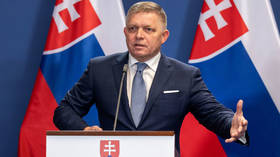[
Robert Fico has sent a letter to the bloc’s leaders, urging action on a looming gas transit halt by Ukraine
Slovak Prime Minister Robert Fico has sent an open letter to European Council President Antonio Costa and European Commission President Ursula von der Leyen, urging immediate action to address Ukraine’s imminent halt of natural gas transit through its territory to the EU.
A transit agreement between Russia and Ukraine is set to expire on December 31. Kiev has refused to extend it, citing the conflict with Moscow.
In a letter posted on Facebook on Sunday, Fico accused Kiev of failing to consider the potential impact its decision will have on the EU economy. Brussels’ acceptance of the situation is “absolutely irrational and wrong,” he stressed.
Gas transit through Ukraine accounts for only 3.5% of EU consumption, the letter states, citing an analysis carried out by Slovakia’s main gas supplier and trader, SPP. Despite the modest share, any halt would disrupt the market, raising gas prices by roughly 30%, the document claims. Such a price spike would translate to an additional annual cost of € 40-50 billion for European households and infrastructure, Fico argued.
“It is in the interest of all EU citizens that European efforts to support Ukraine should be carried out rationally, and not in the form of self-destructive and extremely damaging gestures,” the Slovak prime minister noted. Kiev’s decision will lead to “reciprocal measures,” he warned.
Fico also said Russia “will easily place such a small volume of gas in other markets,” thus mitigating its losses.
The situation requires urgent attention from EU institutions and member states to mitigate risks of supply shortages, he added.
Landlocked Slovakia’s position within Europe’s energy network makes it highly susceptible to disruptions in natural gas supply. The country is reliant on Russia for around 85% of its gas demand, primarily through pipelines transiting Ukraine.
Fico has repeatedly voiced concerns regarding EU energy policy. He has consistently advocated for pragmatic approaches to energy security, often clashing with Brussels on its approach to the Ukraine conflict, namely the issue of military support to Kiev and the issue of economic sanctions against Russia.
European Union leaders have repeatedly expressed confidence in the bloc’s ability to manage without Russian gas, accusing Moscow of using energy as a geopolitical weapon.
The European Commission and Council have yet to issue formal responses to the Slovak leader’s letter.



